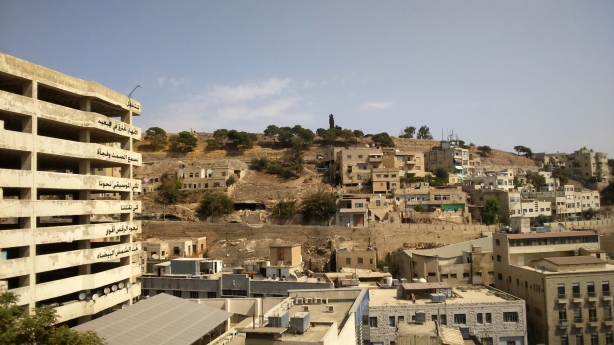
Let us imagine,
The rivers are burning afar.
We hear the silence; when suddenly,
Music comes our way, to kill us,
So that the dance may gain strength and momentum,
Under the white sun.
Many Jordanians, or at least the ones I have on my Facebook feed, for some time, have been discussing the meaning of a poem painted over Al Fuheis complex in Down Town Amman.
The poem is by Moroccan Poet Mohammad Al Baz, and the artwork is by Abdallah Al Karoom. The piece was curated by Darat Al Funun.
So what is the meaning behind this poem?
It means a lot of things for different people.
Poetry, whether induced by drugs – not that we encourage or write poetry that way – or by uninfluenced imagination, is supposed to make us think. Poets want us to take a moment, whether short or long, and contemplate our existence.
As a visual piece this poem is also an excuse for you to look up a little. Aren’t you just tired of looking at your feet as they heavily shuffle over the pavement — the result of gravity?
If every poem came with York Notes* we’d be a less civilized thinking world, but then again the ongoing wars and murder of people over thoughts that question existence, and everything else, are proof that we are far from civilized.
We are where we are because of our thoughts, words, sentences and paragraphs; written and visual.
What is nonsense to someone makes sense to someone else.
Read Samuel Beckett’s absurdist play, “Waiting for Godot“, which will probably not make much sense after the first reading.
The first time I read the “Let Us Imagine” poem I did not give it much thought either. Now that I am 37 and have a little more understanding of life and literature, or so I like to believe, I decided maybe I should try to give it my own interpretation.
Remember I am not trying to enforce this interpretation on anyone; I am merely trying to give you the approach of an English Literature student to a poem.
Let us suppose a professor came up to me and asked me to explain the poem to him.
I would first translate it into English, and then break down its imagery, similes and what have you.
So here goes!
The first line:
Let us imagine,
In the very first line the poet is inviting us to imagine. He is not asking us to believe. He just wants you to take a moment and imagine a scene with him, a scene from his own mind.
The second line:
The rivers are burning afar.
What the poet did here is he gave water, from rivers, the characteristics of a combustible substance. He gave us a supernatural setting. It is either that or someone illegally unloaded chemical waste in a river somewhere.
So where are we now? We are most probably standing on the bank of burning river –part of an apocalyptic vision.
If Adele can Set Fire to the Rain then Moroccan Poet Mohammad Al Baz most surely can set rivers on fire.
The third line and fourth line:
We hear the silence; when suddenly,
Music comes our way, to kill us,
Silence is given a voice. Giving silence a sound is not a new thing. Simon and Garfunkel would know what I am talking about. So what did the poet do by giving silence a sound? He turned him into a person.
In the fourth line we have another case of personification. Music is given a human attribute in the form of action; the ability to kill. The line also bears a symbolic connotation to the emotional effect that music can have on our minds.
The fifth line:
In the following line:
So that the dance may gain strength and momentum,
This line tells us of the motivation behind the actions of Music, the person.
Assuming you’ve survived the attack you will find a way to grow stronger. The attack is on our senses. When hearing music our muscles – commanded by our senses – will break into dance.
German philosopher Friedrich Nietzsche says,” that which does not kill us, makes us stronger.”
The sixth line:
Under the white sun.
The sun in reality is the color white; and white symbolizes purity. We all end up dancing under a pure sun; in a pure world.
Remember the above is what I understood from the poem.
A poem is no different than a mirror; it only bears your own reflection, or what you choose to see, or read into that reflection.
*York Notes are a series of English literature study guides. I remember seeing many students buy them while studying English Literature in the University of Damascus in Syria. Instead of reading an entire novel or a play one could easily buy York Notes and pretend to have read a book.



